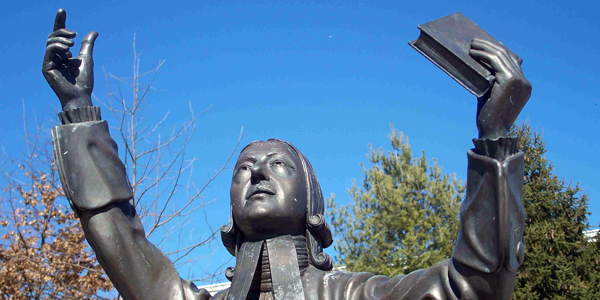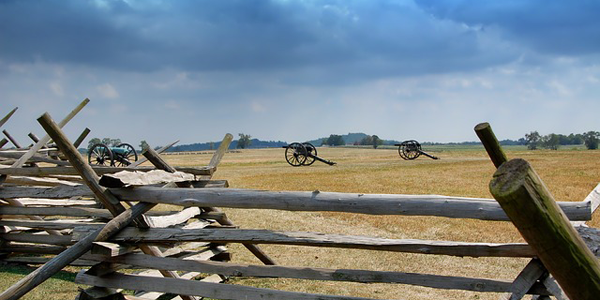Author: Stephen (Page 7 of 17)

Dear Friends,
In light of our being in the closing days of the presidential campaign I want to share with you words of wisdom penned before our country was even birthed. May they challenge us to be people of integrity in all we say and do in these days ahead.
From the journal of the Rev. John Wesley
Thursday, October 6, 1774
“I met those of our society who had votes in the ensuing election and advised them,
- To vote, without fee or reward, for the person they judged most worthy:
- To speak no evil of the person they voted against: And,
- To take care their spirits were not sharpened against those that voted on the other side.”
Blessings,
Pastor Stephen
Source:
This quote has been making the rounds of the internet lately. I did look it up to verify its authenticity from the writings of John Wesley.
Wesley, John. “An Extract of the Rev. Mr. John Wesley’s Journal from September 13, 1773, to January 2, 1776.” The Works of John Wesley, 3rd ed., vol. 4, Baker Books, 2007, p. 29.
Dear Friends,
I have been pondering something the last few days. What if, to your horror, you discovered someone had successfully recorded everything you said in the past week and, to make matters worse, those audio files were now in the hands of Wikileaks? Ten years from now would you be able to run for political office without fear of the recordings being played on the evening news? What if you were going through a divorce? Would you be terrified your spouse’s lawyer would find out about their existence? What if an employee was suing you, or a co-worker, or neighbor? Would you hope these files were deemed inadmissible to the court? What if you were dead and your children wanted to find something that would remind them of the person you were? Would you want them to listen to these files?
If the thought of anyone having a recording of the words said in the week strikes cataclysmic terror to your soul, why? What do you need to change this week about the things you think about and say so you never have to worry about anyone listening to the files?
Paul says in Ephesians 4:29, ” Do not let any unwholesome talk come out of your mouths, but only what is helpful for building others up according to their needs, that it may benefit those who listen.” Would our talk be consistent with the sage advice of Paul? Are we building people up or tearing them down? Decades from now will our words be a solid foundation on which we have built our life or will it be a foundation of clay that crumbles underneath us?
Blessings,
Pastor Stephen
Dear friends,
As you all heard me talk about many times before, I listen to podcasts . . . a lot. One of my favorites is the EntreLeadership Podcast hosted by Ken Coleman. Recently he interviewed the entrepreneur Gary Vaynerchuk. During the interview, Gary said something I had to come back and type it up to share it with you.
As you read this quote Replace the word “entrepreneur’ with church or Christian.
“If you are an entrepreneur or in business, not Donald Trump, not Hillary Clinton, Not Barack Obama, not George W. Bush, none of these human beings are going to help or hurt you . . . That is a straight fact . . . I’ve really been running businesses now for twenty years, and there has been absolutely not even a second let alone a day in my life that I thought oh God great thank God Bill Clinton was President when I started this company. . . there’s never been a day when I’ve said oh man Obama has stopped me from being successful. That is loser talk with a triple capital L . . . I feel bad for the person that says, ‘Well if Trump wins or if Hillary wins or Barack wins or if George wins like I’ll be better . . .’ To think that your future rests in the hands of the government, that is a recipe for disaster, and you will turn into a pawn.” (Source: https://www.entreleadership.com/podcasts/144-gary-vaynerchuksecrets-of-growth)
At the end of the day, the person who may or may not be in the White House has no bearing what so ever on our ability to be people of the Kingdom of God. Nor does it change our call to declare to the world “The Kingdom of God is near.” The church will persevere. The will of God will be done. There has never been a day in history when a political leader, no matter how good or bad, made one once of difference on this truth.
Let us not be consumed with fear or anxiety about the future. Let us not place our hope in anyone but Jesus Christ.
Blessings,
Stephen
What are we inviting people to? What really is the “good news” we want people to accept? When I was a kid, my favorite book of the bible was Joshua. It was a grand adventure and story to be entered into. In time the childish things were put away and the adventure was lost. Replaced by a more mature reading of scripture. Many days my heart still aches for those days of simple adventure.
Then I get to the gospel stories and wonder if Jesus’ isn’t trying to reawaken an adventure long lost in centuries of rules and system. Jesus didn’t invite people to become objects to be used by the church for its purposes. He invited them into the adventure of God’s story. Alan Roxburgh, in his book, Missional, convictingly and powerfully reminds me of the power of Jesus’ story:
There was this freedom in Jesus’s stories. I can’t believe those who heard them felt that Jesus had some other agenda going on underneath, that he was only interested in how they could fit into his plan. In Jesus’s hands, stories opened worlds for people whose imaginations had collapsed down narrow tunnels with little light. Often Jesus’s stories became landmines. At first, they seemed innocent enough, but once a person got inside the story or parable, it would explode unexpectedly, crack open little worlds, disorient a taken-for-granted life, disrupt practiced scenarios, and overturn assumptions so that the brightness of God’s future could be seen.
Be honest, are we inviting people to an adventure or to another job?
Stephen
Source:
Roxburgh, Alan J. Missional : joining God in the neighborhood. Grand Rapids, Mich: Baker Books, 2011. pg 82.
Dear Friends,
Recently I was listening to a podcasted sermon from College Wesleyan Church out of Marion, Indiana. In the sermon was a quote from the civil rights leader and founder of the Christian Community Development Association, Dr. John Perkins. In the quote, Dr. Perkins challenges how we define a successful church. With a little help from Google, I was able to find the original context of the quote and I share the context here to challenge each of us:
“How do you measure the success of a church?” This penetrating question was posed by Dr. John Perkins . . . Little did I know that this seemingly innocuous question would lead me on a journey that would forever change my life.
I was a pastor’s kid, and it seemed in the moment that a response should be coming to me more quickly than it was. Yet I could not find a cogent answer that seemed complete enough.
Dr. Perkins continued to poke at us. He began to list potential answers to his question. “Is success determined by your Sunday service attendance?” This was always the first item on a pastor’s resume, yet we were pretty sure this was not the answer. “How about the size of the church budget? Maybe success should be measured by how many staff the church employs? Maybe success is determined by how many periodicals write stories on your church. How do you measure the success of a church?
When he was satisfied with the uneasiness in the room, he finally offered his own perspective on what the answer should be. “The success of a local church should be directly tied to the degree that it holistically transforms its immediate neighborhood. Any other success factor is secondary?”
Bill Hybels is known for the saying, “The local church is the hope of the world.” All too often, however, our definitions of success have very little to do with hope for the world but are instead measurements of the size of our own kingdoms. We measure success in the local church by how big of a building we have, how nice the building looks, how great the preaching is, how many people are sitting in the chairs (no successful church could have pews), and how much money is in the offering plate. But what if success is really none of these? What if success is measured not in the size of our kingdom but in the impact of the Kingdom of God in our neighborhoods? What would that change in the ways we do ministry?
Stephen
The quote comes from the book:
Fuder, John, and Noel Castellanos. A heart for the community : new models for urban and suburban ministry. Chicago, IL: Moody Publishers, 2013
We have all had that boss. You know the one that makes the pointy-haired boss in the Dilbert cartoons look like a managerial ninja. There are not enough hours in the day to tell the stories of the trauma we experienced at the hands of our micromanaging bosses. The micromanager will say they view themselves as an empowerer of employees. If pressed further to explain why they must check with a ruler the trash bags to make sure the tops of the bag descends exactly 2.78 inches over the lip of the garbage can the micromanager will say it is because it is important . . . and everything is important.
The foundation of any relationship is trust. The micromanager has none. If they trusted their employees they would allow their employees to do the job for which they were hired. What keeps them from trusting? Low self-confidence and fear. They doubt themselves and their employees. They are filled with fear of what could happen if they were not there to handle every situation. No one likes a micromanager.
All of us have a little micromanager inside of us. This manager’s name is “fear.” But it is not employees we are hovering over it is God. To be consumed by fear is to micromanage God. Craig Groeschel puts it another way “Fear is placing your faith in ‘what-ifs’ rather than in ‘God is.'”
What’s the problem with micromanaging God? First, you are not his boss. Nothing more should really need to be said here. Second, do you honestly think you can run the world better than its creator and sustainer?
In this dramatic political season, many of us are tempted to be fearful of the “what-ifs.” To do so is to attempt to manage our world and not trust God’s capacity to manage. It is to place our faith in our capabilities or the capabilities of a particular candidate rather than the capabilities of God.
In this time, let us place our faith in who God is rather than being consumed by what could be.
Blessings,
Stephen

Dear Friends,
I am excited to share with you that I have entered a new phase of life and ministry. I am now officially an onine Doctor of Ministry student at Asbury Theological Seminary in the Activating Missional Communities program, while still serving as pastor at Hope. This new journey means a lot of things, not the least of which, is that my Kindle and I are becoming close and personal friends.
As individuals hear about my taking this step the first question is often, “Why?” While the answer is somewhat complex I wanted to take a moment to share with you some of my thoughts, largely taken from my program application.
The purpose of studying, at this time in my ministry, is about increased potential and opportunity. As a leader, as I grow the church grows. Maybe not necessarily numerically but certainly in ways that matter. From my perspective, working toward a D. Min. is a unique opportunity to learn and grow from some of the greatest leaders in the church and bring their wisdom into our particular situation at Hope. Studying in this type of program is also an opportunity for me to exponentially increase my knowledge in ways not so easily done through self-study.
One particular area of leadership growth and development I am particularly interested in is the area of discipleship. When I was in seminary Dr. David Holdren, who was then a General Superintendent, spoke with the Wesleyan students. On a white board, he drew out for us a system of discipleship he had just learned about that used a baseball diamond. As he described this baseball-based model, he said that all of us needed to develop a model of discipleship. At the time, I did not fully understand his advice, but I have always remembered those words of counsel.
Years later I read the book Home Run Life by Kevin Myers and realized this was the model Dr. Holdren was showing to us. I have also read other books explaining a particular pastor’s model for discipleship. I have been struck by the realization, if you boil them all down, they are really all about the same. This realization regarding each of these models brought me back to the words of advice from Dr. Holdren when I was in seminary.
I feel one of the greatest challenges for the church is in the area of discipleship. Our current answer to the question of whether we are effectively developing wholly devoted followers of Christ is a poor one. As I have been processing this reality, I have been working to formulate an effective system for our particular context. Much work remains, but I believe such a system:
- needs to be self-assessing. The church no longer has the authority, if it ever did, to say to a person you are a spiritual infant (even though you have been in the church for 40 years).
- while self-assessing, must naturally lead people to movement and growth. There is no condemnation for where a person is at. What is important is not where a person is at. What is important is that they are moving.
- must take into account the realities of church membership/attendance. A “committed” church member may realistically only attend 50-75% of the time.
- must take into account, even if a person attends 100% of the time, Sunday morning is not enough.
- must go to where people are at. Church attendance is not a natural choice for the spiritual “nones.” John Wesley would go in the early morning hours and stand on the coal piles outside the coal mines and preach to the miners before they would go down into the mines each day. Where are the coal piles today? Every day people walk into darkness. How do we give them light to take with them, even if they are not followers of Jesus?
- must make use of, build on, and find fresh expressions of the disciplines and traditions of the past 2,000 years of Christendom.
- must make room for the Spirit to work in people’s lives on the Spirit’s timeline.
- must be Kingdom centered. God is not a respecter of people, cultures or nations.
- must be full of grace and truth.
- must challenge people to, as Richard Stearns says, to “go nuclear.” In generations past missionaries would load their belongings into a coffin knowing they were never coming home. Today hundreds of thousands of people applied to be the first humans to travel to Mars, knowing it will be a one-way journey. Are we calling and challenging people to do great things for God, even things as crazy as traveling to Mars?
- must scale up and scale down. Will it guide people as effectively in their spiritual growth in a church of two as a church of 100,000?
- must empower others to lead and reproduce.
In the process of implementing such a system, we have many amazing resources available to us today to help us connect with each other and grow together. These include, but are certainly not limited to podcasting, webinars, blogging, and various social media platforms.
Along this journey I will be sharing in this blog insights I am learning and questions I am pondering. I encourage you to interact and share your thoughts. Some of the things I may share may be controversial or push some buttons. I don’t promise to even completely agree with everything I post. This will be a learning opportunity for all of us to be stretched and grow and I welcome the chance to process these concepts with all of you. I know that I have much to learn.
Blessings,
Stephen
Dear Friends,
One of the most loaded verses in the Bible is also one easily missed. Found at the very beginning of 2 Samuel 11, we read, “In the spring, at the time when kings go off to war, David sent Joab out with the king’s men and the whole Israelite army. They destroyed the Ammonites and besieged Rabbah. But David remained in Jerusalem.”
What follows is the disastrous story of David, King of Israel, stealing another man’s wife. A man who was off fighting David’s battles. The woman, Bathsheba, becomes pregnant and David contrives to hide his sin ultimately killing her husband, Uriah, and other innocent men, all in an effort to hide a “moment of pleasure.”
In the story of David’s sin we find three questions, that, depending on how we answer them, can serve as a test to help us avoid the opportunity to sin. They are:
Am I where I should be?
David was the warrior king of Israel. The place he should have been was on the battlefield with the army. Had he been there, instead of on a rooftop at the palace, the possibility of his being tempted to sin would not have existed.
Am I with who I should be with?
David should have been, needed to be, with his men. With Joab his commander. With his army. These were his support community. These were the men who had the ability to tell the king, “No!” In the palace were only the servants who had to follow the king’s orders.
Am I doing what I should be doing?
As has already been said, David was a warrior king. His place was alongside Joab planning battlefield strategy. Instead, he was stuck in the palace in Jerusalem. Even if he was attending to the affairs of the growing city of Jerusalem it was not his role. He was the king, the management of the city should have been left to another. Had he been doing what he should have been doing likely his soul would not have been so restless he would seek to appease it with a one-night-stand.
When we sin we can come up with all kinds of excuses and justifications. The temptation was too great. I deserve a little pleasure. My spouse is not meeting my needs. If God had not wanted it to happen, he would not have opened the door.
But in the dark recesses our souls, if we are willing to be honest with ourselves, we know the reason for our sin and temptation is because of the answer to one or more of the questions above. We are not in the place we should be. We are not with the people we should be with. We are not doing what we should be doing. And because of this we are open and exposed to temptation. Failure is lurking at our doorstep.
Stephen
Don’t worry, I really don’t want to know the answer to the question. No matter how clean we live our lives all of us, eventually, need to take a shower. Even if you don’t think you do, the world around you does. Taking a shower refreshes, cleanses, and renews making use feel better about ourselves and the world feel better about us. If you don’t believe me, try going a month or two without taking a shower . . . but please, just this once, I implore you to trust me on this one, just this once.
When was the last time you took a spiritual shower? Taking a spiritual shower is pausing for a moment to reflect and evaluate on your spiritual health and then removing the muck that has accumulated.
All of us going through life tend to just accumulate stuff and some of that stuff causes us to smell to those around us. Taking a spiritual shower is a cleansing action to get rid of the stuff that and adhered itself to us. We develop unhealthy habits. We believe things that are not true. We have become lazy in our relationships. Even the cleanest of us need to take moments of spiritual cleansing, refreshing and renewing.
So please, take a shower! You will smell better to everyone around and feel a lot better about yourself as well.
Stephen







